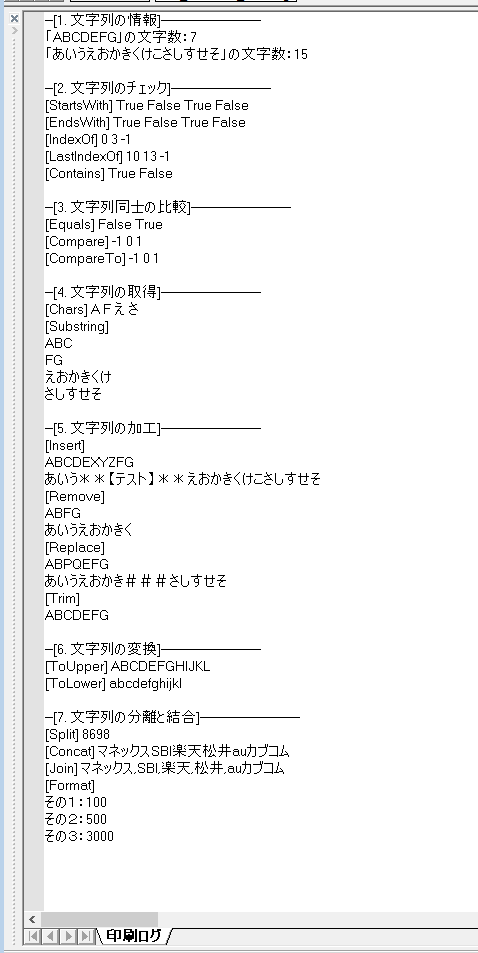文字列に関する型クラスです。文字列を操作するためのプロパティやメソッドが利用できます。
概要
文字列の様々な”操作”ができるようになると、表現の幅が広がり非常に便利です。文字列の一部を取得したり、文字数を数えたり、文字列同士を比較したり・・。ELStringを使えば、様々な文字列操作を手軽に行なえます。
よく使うプロパティ/メソッド
1. 文字列の情報
| 命令 |
目的 |
戻り値の型 |
| Length |
対象文字数を取得 |
int |
2. 文字列のチェック
| 命令 |
目的 |
戻り値の型 |
| StartsWith( strA) |
対象文字列がstrAから始まっているかチェック |
bool |
| EndsWith( strA ) |
対象文字列がstrAで終わっているかチェック |
bool |
| IndexOf( strA) |
対象文字列内で最初にstrAが現れる位置を、先頭からの文字数で取得 |
int |
| LastIndex( strA) |
対象文字列内で最後にstrAが現れる位置を、先頭からの文字数で取得 |
int |
3. 文字列同士の比較
| 命令 |
目的 |
戻り値の型 |
| Equals( strA ) |
対象文字列とstrAが等しいかどうかチェック |
bool |
| CompareTo( strA ) |
対象文字列とstrA順序(辞書順)を比較(対象文字列 > strA なら「1」) |
int |
| ELString.Compare( strA, strB ) |
strAとstrBの順序(辞書順)を比較(strA > strB なら「1」) |
int |
4. 文字列の取得
| 命令 |
目的 |
戻り値の型 |
| Chars( index ) |
対象文字列の先頭から数えてindex番目にある文字を取得 |
string |
| Substring( startIndex ) |
対象文字列の先頭から数えてstartIndex番目から、最後までの文字列を取得 |
string |
| Substring( startIndex, count ) |
対象文字列の先頭から数えてstartIndex番目から、count個の文字列を取得 |
string |
5. 文字列の加工
| 命令 |
目的 |
戻り値の型 |
| Insert( startIndex, strA ) |
対象文字列の先頭から数えてstartIndex番目に文字列strAを挿入 |
string |
| Remove( startIndex ) |
対象文字列の先頭から数えてstartIndex番目以降を削除 |
string |
| Remove( startIndex, count ) |
対象文字列の先頭から数えてstartIndex番目からcount個の文字列を削除 |
string |
| Replace( oldStr, newStr) |
対象文字列内にある文字列oldStrをnewStrに置き換え |
string |
| Trim() |
対象文字列の前後にある半角スペースを削除 |
string |
6. 文字列の変換
| 命令 |
目的 |
戻り値の型 |
| ToUpper() |
対象文字列をすべて大文字に変換 |
string |
| ToLower() |
対象文字列をすべて小文字に変換 |
string |
7. 文字列の分離と結合
| 命令 |
目的 |
戻り値の型 |
| Split( separator ) |
対象文字列を文字separatorで分割し、Vectorに格納する |
Vector |
| ELString.Concat( strA, strB, .. ) |
strA以降の文字列をすべてつないだ文字列を作成する |
string |
| ELString.Join( strSeparator, strA, strB, .. ) |
strA以降の文字列をすべて、文字strSeparatorでつないだ文字列を作成する |
string |
| ELString.Format( strFormat, strA, strB, .. ) |
strFormatに指定したフォーマットで文字列を作成する |
string |
EasyLanguageサンプルコード
インジケーターを新規作成して以下のコードを貼り付け、チャートに設定ください。結果が印刷ログに表示されます。
using elsystem;
using elsystem.collections;
Vars:
string strOutput( "" ),
string strText1( "" ),
string strText2( "" ),
string strText3( "" ),
string strText4( "" ),
Vector vecChar( NULL ),
int intValue1( 0 ),
int intValue2( 0 ),
int intValue3( 0 );
Once ( LastBarOnChartEx ) Begin
ClearPrintLog;
//----------------------------------------
// 1. 文字列の情報
//----------------------------------------
print( "--[1. 文字列の情報]-------------------------" );
strText1 = "ABCDEFG";
strText2 = "あいうえおかきくけこさしすせそ";
strOutput = ELString.Format(
"「{0}」の文字数:{1}" + NewLine +
"「{2}」の文字数:{3}",
strText1,
strText1.Length,
strText2,
strText2.Length
);
print( strOutput );
//----------------------------------------
// 2. 文字列のチェック
//----------------------------------------
print();
print( "--[2. 文字列のチェック]-------------------------" );
strText1 = "ABCDEFG";
strText2 = "あいうえおかきくけこさしすせそ";
strOutput = ELString.Format(
"[StartsWith] {0} {1} {2} {3}",
strText1.StartsWith( "A" ),
strText1.StartsWith( "D" ),
strText2.StartsWith( "あ" ),
strText2.StartsWith( "か" )
);
print( strOutput );
strOutput = ELString.Format(
"[EndsWith] {0} {1} {2} {3}",
strText1.EndsWith( "G" ),
strText1.EndsWith( "D" ),
strText2.EndsWith( "そ" ),
strText2.EndsWith( "ん" )
);
print( strOutput );
strText3 = "ABCDEABCDEABCDE";
strOutput = ELString.Format(
"[IndexOf] {0} {1} {2}",
strText3.IndexOf( "A" ),
strText3.IndexOf( "D" ),
strText3.IndexOf( "X" )
);
print( strOutput );
strOutput = ELString.Format(
"[LastIndexOf] {0} {1} {2}",
strText3.LastIndexOf( "A" ),
strText3.LastIndexOf( "D" ),
strText3.LastIndexOf( "X" )
);
print( strOutput );
strOutput = ELString.Format(
"[Contains] {0} {1}",
strText3.Contains( "CD" ),
strText3.Contains( "XY" )
);
print( strOutput );
//----------------------------------------
// 3. 文字列同士の比較
//----------------------------------------
print();
print( "--[3. 文字列同士の比較]-------------------------" );
strText1 = "ABCDE";
strText2 = "VWXYZ";
strText3 = "ABCDE";
strOutput = ELString.Format(
"[Equals] {0} {1}",
strText1.equals( strText2 ),
strText1.equals( strText3 )
);
print( strOutput );
strOutput = ELString.Format(
"[Compare] {0} {1} {2}",
ELString.Compare( strText1, strText2 ),
ELString.Compare( strText1, strText3 ),
ELString.Compare( strText2, strText3 )
);
print( strOutput );
strOutput = ELString.Format(
"[CompareTo] {0} {1} {2}",
strText1.CompareTo( strText2 ),
strText1.CompareTo( strText3 ),
strText2.CompareTo( strText3 )
);
print( strOutput );
//----------------------------------------
// 4. 文字列の取得
//----------------------------------------
print();
print( "--[4. 文字列の取得]-------------------------" );
strText1 = "ABCDEFG";
strText2 = "あいうえおかきくけこさしすせそ";
strOutput = ELString.Format(
"[Chars] {0} {1} {2} {3}",
strText1.Chars[0],
strText1.Chars[5],
strText2.Chars[3],
strText2.Chars[10]
);
print( strOutput );
strOutput = ELString.Format(
"[Substring] " + NewLine +
"{0}" + NewLine +
"{1}" + NewLine +
"{2}" + NewLine +
"{3}",
strText1.Substring( 0, 3 ),
strText1.Substring( 5 ),
strText2.Substring( 3, 6 ),
strText2.Substring( 10 )
);
print( strOutput );
//----------------------------------------
// 5. 文字列の加工
//----------------------------------------
print();
print( "--[5. 文字列の加工]-------------------------" );
strText1 = "ABCDEFG";
strText2 = "あいうえおかきくけこさしすせそ";
strOutput = ELString.Format(
"[Insert]" + NewLine +
"{0}" + NewLine +
"{1}",
strText1.Insert( 5, "XYZ" ),
strText2.Insert( 3, "**【テスト】**" )
);
print( strOutput );
strOutput = ELString.Format(
"[Remove]" + NewLine +
"{0}" + NewLine +
"{1}",
strText1.Remove( 2, 3 ),
strText2.Remove( 8 )
);
print( strOutput );
strOutput = ELString.Format(
"[Replace]" + NewLine +
"{0}" + NewLine +
"{1}",
strText1.Replace( "CD", "PQ" ),
strText2.Replace( "くけこ", "###" )
);
print( strOutput );
strText3 = " ABCDE ";
strOutput = ELString.Format(
"[Trim]" + NewLine +
"{0}",
strText1.Trim()
);
print( strOutput );
//----------------------------------------
// 6. 文字列の変換
//----------------------------------------
print();
print( "--[6. 文字列の変換]-------------------------" );
strText1 = "ABcdeFGhiJKL";
strOutput = ELString.Format(
"[ToUpper] {0}" + NewLine +
"[ToLower] {1}",
strText1.ToUpper(),
strText1.ToLower()
);
print( strOutput );
//----------------------------------------
// 7. 文字列の分離と結合
//----------------------------------------
print();
print( "--[7. 文字列の分離と結合]-------------------------" );
strText1 = "1321,1570,1357,8698,9984";
vecChar = strText1.Split( "," );
strOutput = ELString.Format(
"[Split] {0}",
vecChar.Items[3] astype string
);
print( strOutput );
strText2 = ELString.Concat(
"マネックス",
"SBI",
"楽天",
"松井",
"auカブコム"
);
strOutput = ELString.Format(
"[Concat] {0}",
strText2
);
print( strOutput );
strText3 = ELString.Join(
",",
"マネックス",
"SBI",
"楽天",
"松井",
"auカブコム"
);
strOutput = ELString.Format(
"[Join] {0}",
strText3
);
print( strOutput );
intValue1 = 100;
intValue2 = 500;
intValue3 = 3000;
strOutput = ELString.Format(
"[Format]" + NewLine +
"その1:{0}" + NewLine +
"その2:{1}" + NewLine +
"その3:{2}",
intValue1,
intValue2,
intValue3
);
print( strOutput );
End;
{ ** Copyright © Trade Tech All Rights Reserved ** }
表示例

本クラスの使いどころ
ELStringを使った文字列操作ができるようになると、チャートやレーダースクリーンに表示させる文字や、外部ファイルに出力したい内容などを自由自在に加工できるようになります。
高度なプログラムを作っていく上では必須の知識となりますので、ぜひ上のコードにある各変数(strText1など)を好きなものに変えてみながら、動作を確認してみてください。
クラス一覧ページに戻る
